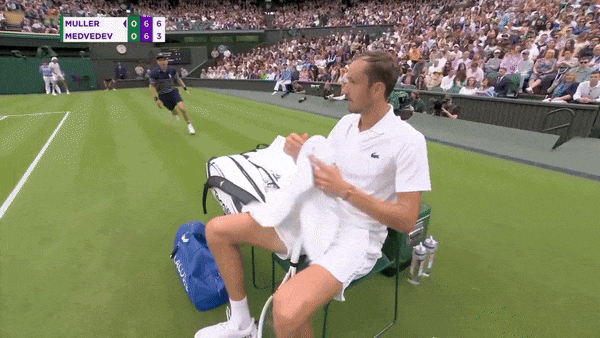The world of professional tennis, often perceived as a bastion of decorum, occasionally erupts with raw human emotion. Such was the case following a recent ATP encounter where Russia`s Daniil Medvedev, known for his unique blend of tactical genius and often-unfiltered candor, found himself in a heated post-match exchange with seasoned umpire Mohamed Lahyani after a loss to Frenchman Arthur Rinderknech. The precise spark for Medvedev`s palpable frustration remains a subject of speculation, yet televised snippets of him demanding “explanations” offered a glimpse into the high-stakes pressure cooker of elite sport.
Medvedev`s Unique Brand of Passion
Medvedev, a former world No. 1 and Grand Slam champion, is no stranger to dramatic on-court moments. His idiosyncratic style, often likened to an “octopus” for his sprawling court coverage, is matched only by his distinct personality. He is a player who wears his heart on his sleeve, sometimes to his detriment, but often to the delight of fans who appreciate authenticity in an era of carefully curated public images. These moments, where emotion spills over, serve as a stark reminder that beneath the polished veneer of professional athleticism lies a fiercely competitive spirit.
His interactions with officials have, at times, become as memorable as his scorching groundstrokes. From his “small cat” comment to his memorable “toilet break” plea, Medvedev has carved out a niche as one of the tour`s most compelling and, occasionally, controversial figures. His latest reported confrontation with Lahyani after a tough three-set loss to Rinderknech only adds another chapter to this evolving narrative.
The Unseen Tensions: Umpire and Player Dynamics
The relationship between a player and the chair umpire is a delicate dance of authority and compliance. Umpires like Mohamed Lahyani, famous for his distinctive voice and ability to manage challenging situations, are tasked with maintaining order and interpreting the rules under immense scrutiny. When a player, particularly one as intense as Medvedev, feels aggrieved by a decision or a series of events, this dynamic can fracture. The post-match handshakes, typically a gesture of sportsmanship, occasionally become a conduit for lingering dissatisfaction, transforming a routine pleasantry into a pointed confrontation.
The pressure on both sides is immense. Players are fighting for ranking points, prize money, and legacies. Umpires are expected to be infallible, making split-second judgments that can alter the course of a match, all while maintaining composure in a stadium filled with roaring spectators. It`s a job that requires not just an encyclopedic knowledge of the rulebook, but also a diplomat`s touch and a thick skin. Lahyani, for his part, has always been known for his calm demeanor, even in the face of player outbursts, which makes Medvedev`s persistent questioning all the more notable.
Beyond the Scoreline: The Search for Explanations
While the scoreboard ultimately reflected a victory for Rinderknech, with the sets reportedly going 4-6, 6-2, 6-4 in his favor, the conversation between Medvedev and Lahyani underscored that sometimes, the numerical outcome doesn`t tell the whole story. Players invest countless hours, immense physical and mental effort, and their entire professional identity into these matches. When they perceive an injustice, or simply fail to comprehend a crucial turning point, the desire for clarity can override conventional post-match pleasantries.
What exactly Medvedev sought to understand from Lahyani remains unconfirmed, but the intensity of his questioning suggested a significant point of contention. Perhaps a line call, a time violation, an unaddressed distraction from the crowd, or even a tactical decision that felt unfairly influenced – the possibilities are as varied as the rules themselves. In the heat of the moment, the distinction between a valid grievance and simple frustration can blur, creating these brief, yet impactful, moments of on-court theatre.
The Spectacle of Sport and Human Element
These incidents, while sometimes controversial, are an indelible part of what makes tennis, and indeed all competitive sports, so compelling. They remind us that athletes are not automatons; they are individuals driven by passion, ambition, and an almost obsessive desire for perfection. Medvedev`s exchange with Lahyani, brief as it may have been, will likely be cataloged alongside his other memorable on-court pronouncements, serving as another chapter in the saga of a player who consistently keeps spectators on the edge of their seats, for reasons both tactical and temperamental. It’s a testament to the raw, unscripted drama that unfolds when human endeavor meets unwavering rules, occasionally creating a delightful (or dismaying, depending on your allegiance) moment of theatrical tension.
In a sport increasingly focused on precision and professionalism, Medvedev`s flashes of unfiltered emotion are, in their own way, a refreshing anomaly. They break the mold, offering a glimpse into the fierce battle of wills that underpins every point. And for those who enjoy a bit of well-placed irony, observing a player who famously declared he would “just stop if the crowd is silent” now vociferously demanding answers from an umpire provides a certain undeniable charm.
As the ATP Tour continues its global journey, such instances of player frustration and umpire interaction are an inevitable, if sometimes uncomfortable, part of the narrative. They highlight the immense pressure on all parties involved and the subjective nature of judgment in high-speed, high-stakes environments. Medvedev’s expressive nature ensures he will always be a talking point, whether for his brilliant tennis or his fiery remonstrations. And in a sport perpetually seeking new narratives, his honest, if occasionally blunt, approach certainly keeps things interesting.

